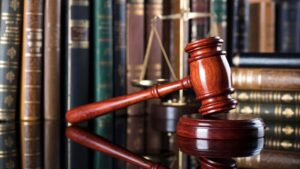
When you suffer injuries in a motorcycle accident, you have a right to pursue damages from the party responsible. Who you can sue after a motorcycle accident varies depending on the circumstances of your accident.
To recover damages after a motorcycle crash, you must establish who is responsible. In addition, you will need evidence to show how the at-fault party caused the accident, whether they were negligent, and what losses you suffered as a result. A skilled Michigan motorcycle accident lawyer can help you determine who to sue after a motorcycle crash and explain the legal process.
Who is Liable After a Motorcycle Accident?
To sue someone for a motorcycle crash, you must first establish that they were responsible. Sometimes, only one driver is liable for the harm. For example, if a motor vehicle driver switched lanes without checking for other motorists or signaling, they could be solely liable for the ensuing accident. Although these cases may seem more straightforward, actually proving liability can still be tricky.
Many motorcycle accidents are even more complicated. There may be more than one vehicle operator involved, or the road conditions could play a role in the accident. In some cases, your motorcycle crash may not involve any other vehicles. Discovering liability in such cases may involve deeper investigation, and you must provide proof that the responsible party directly or indirectly caused your injuries.
A common example of such a claim would be a dangerous pothole in the road. The pothole could be due to the city’s neglect, or it could be the result of nearby construction or utility work. In this case, you would need to discover who was responsible for the pothole and establish that they had a duty to fix or warn of the pothole.
Common Liable Parties in Motorcycle Crashes
Parties responsible for a motorcycle accident may include:
- Another driver or drivers
- The at-fault driver’s employer, especially for commercial truck drivers and delivery companies
- The at-fault driver’s insurance company
- Construction, utility, or landscaping company that left debris or damaged the road
- City or municipal authority responsible for road maintenance and repairs
- City or other authority responsible for damaged or malfunctioning traffic signs and signals
As you can see, you can sue many parties for a motorcycle accident. Sometimes, more than one party is liable, which can make the case even more complicated. For instance, an improperly licensed commercial truck driver who strikes a motorcyclist can be liable for the resulting accident. Their employer could also be liable for hiring a truck driver without appropriate licensing and training.
How Do I Prove Negligence For a Motorcycle Accident?
While you may know how the accident occurred, suing the at-fault party requires proving they caused the accident. Most motorcycle accident and other personal injury claims rely on proving the following four elements of negligence:
- Duty of Care: You must show that the at-fault party had a duty of care. For instance, a truck driving company has a duty to ensure their drivers are properly licensed.
- Breach of Duty: You must establish that the responsible party breached their duty of care. For example, the trucking company failed to ensure their driver had proper licensing and training before allowing them to operate a semi-truck.
- Causation: You must show that the at-fault party’s breach of the duty of care directly or indirectly caused your accidents. For instance, an unlicensed truck driver was not aware of the measures they should take to avoid collisions, and their lack of knowledge and training caused them to collide with your motorcycle. The driver and their employer who allowed them to drive unlicensed and untrained could both be considered negligent.
- Damages or Losses: You must be able to prove that the motorcycle accident caused by the responsible party’s negligence caused you to suffer injuries and losses.
Proving negligence means finding evidence to prove the four elements of negligence. Evidence may include photos and videos of the motorcycle crash, medical records, witness statements, police reports, commercial driver’s logs, and expert testimony. A knowledgeable motorcycle accident lawyer will have the knowledge and resources to help you investigate the accident’s cause and prove the other party’s negligence.
What Damages Can I Recover for My Motorcycle Injuries?
Damages you can recover through a personal injury lawsuit in Michigan differ depending on the state where the accident occurred. In Michigan, you can seek compensation losses like:
- Past and future medical expenses
- Mental anguish
- Lost current and future income
- Reduced quality of life
- Pain and suffering
The types of damages you can recover can also vary depending on the extent and severity of your injuries. For instance, if you suffer permanent disability due to your injuries, you could recover compensation for domestic assistance, in-home care, and other services required to help you return to your normal life.
Comparative Fault and Damage Recovery
Another factor that can greatly affect your injury claim is comparative fault. In some states, if you carry some responsibility for the motorcycle accident, it could affect your ability to file a lawsuit for damages. For example, Michigan law states that anyone more than 50 percent responsible for the accident will have some compensation reduced, and they may not be able to claim other types of damages.
A personal injury firm that specializes in motorcycle accidents can help you understand comparative fault in your state and determine how such laws can affect your case.
What Options Do I Have to Recover Damages Following a Motorcycle Crash?
You have several options to recover damages following a motorcycle accident. Understanding your options can help you pursue fair compensation for the full scope of your losses. The two primary methods for recovering compensation are insurance claims and a personal injury lawsuit.
Filing an Insurance Claim
Some states, like Michigan, have no-fault laws that allow drivers to recover compensation through personal injury protection (PIP) coverage. Motorcyclists are typically excluded from such policies unless the accident involved a motor vehicle. The motorcyclist must typically have a PIP policy on a vehicle to file a claim in an accident involving a motor vehicle.
Most states require motorists to carry liability protection for any motor vehicles on the road. Typically, you can file a claim with the at-fault party’s liability insurance carrier to recover damages caused by their negligence. Such claims can be complicated, especially since insurance companies are motivated to pay as little as possible.
If the at-fault party’s insurance or your PIP coverage is insufficient to cover your losses, you may file a claim with your uninsured/underinsured motorist coverage. Additional coverage for medical bills may also be available through your private medical insurance.
Filing a Personal Injury Lawsuit
Insurance claims often have policy limits on damages and payouts. To achieve maximum recovery, you may need to file a personal injury lawsuit against the at-fault party and their insurance carrier. A timely lawsuit can motivate the at-fault party to offer a fair settlement so they can avoid time-consuming and expensive court proceedings.
Additionally, you may be able to recover non-economic losses such as pain and suffering and mental anguish that the insurance company may otherwise refuse to cover. A skilled motorcycle accident lawyer can represent you in negotiations with insurance companies and during trial proceedings.
Contact a Dedicated Motorcycle Accident Attorney For Assistance
Who you can sue after a motorcycle accident varies depending on the circumstances surrounding your accident. The motorcycle accident lawyers at Christensen Law can help you determine who is responsible for your accident. Our dedicated legal team can provide the guidance you need to seek justice and fair compensation. Contact us today to arrange a free consultation and discuss your legal options.






